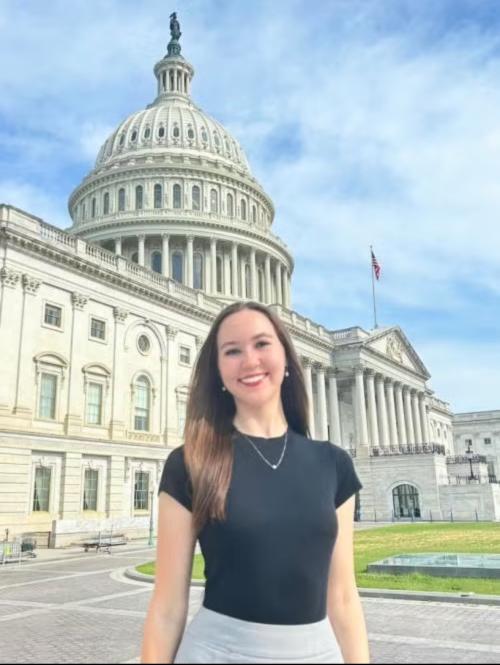
Internships: Leadership in Action
We provide students with leadership opportunities.
Our internships provide indispensable opportunities to explore careers in public service, government, and the private sector; build your resume with professional experience; network with potential employers; perhaps travel to Washington D.C., or abroad; and prepare for post-graduate degrees.
A sample of SCETL student internships (local, national, and global)
- African Refugee Development Center (Israel)
- Arizona Attorney General
- Arizona Board of Regents
- Arizona Coalition to End Sexual and Domestic Violence
- Arizona Diamondbacks
- Arizona Girl Scouts
- American Enterprise Institute
- American Philanthropic
- Arizona Free Enterprise Club
- Barefoot College (India)
- Bipartisan Policy Institute
- Congressman David Schweikert
- Department of State
- Free the Slaves
- Goldwater Institute
- Governor Doug Ducey
- Hudson Institute
- Law Firms (various)
- Leadership Society of Arizona
- Maricopa Country Superior Court
- National Journalism Center
- Phoenix Children's Museum
- Political Campaigns (various)
- Representative Ruben Gallego
- Senator Kyrsten Sinema
- Senator Mark Kelley
- Teach for America
- Tempe Public Library
- The Fund for American Studies
- White House Office of Technology
The School of Civic and Economic Thought and Leadership works closely with congressional offices in Arizona, nationwide, and Washington D.C., as well as nonprofits, government agencies, and large and small businesses to develop internship programs for its students.
Our students are interested in facing complex problems, aspiring to become leaders in their field, and are just as eager to learn outside the classroom as they are inside.
The school accepts internship programs for the summer, fall, and spring semesters. If you're interested in submitting an internship to be posted to our internship portal, or you need to submit an evaluation on an intern you recently hosted, click below.
You will need to work 7-10 hours per week in a paid or unpaid position and enroll in CEL 484 to earn three credits and meet the SCETL graduation requirement.

The School of Civic and Economic Thought and Leadership is known for its innovative blend of detailed academic study and practical application, preparing students for success in various career paths. Among the many opportunities available to SCETL students, the internship program stands out as a cornerstone of the educational experience. One student who fully embraced this opportunity is Sophia Thomason, a junior majoring in Civic and Economic Thought and Leadership with minors in Art History and French and a certificate in Philosophy, Politics, and Economics (PPE).
Sophia recently completed an internship with Parents Defending Education as part of The Fund for American Studies (TFAS) Economics and Public Policy program in Washington, D.C. Her time as a policy research intern gave her a firsthand look at how classroom knowledge can translate into impactful real-world work.
“For me, the SCETL internship requirement is invaluable,” Sophia shared. “It’s more than just checking a box for graduation—it bridges the gap between academic knowledge and the practical application necessary for success after college.”
Read Sophia's full story here.
Internship Process
Step 1: Find your internship
There are a few ways to find the right internship for you.
- Schedule a meeting with our internship coordinator Dr. Susan Carrese.
- Browse companies or organizations that interest you or go to career fairs. If you find an internship opportunity, talk to the SCETL team about how to apply it for academic credit.
- Use ASU resources, including Sun Devil CareerLink and Handshake.
Step 2: Apply to the internship
Before you start the application process, schedule a meeting with Dr. Susan Carrese to review your resume and cover letter. (Don't have one? We'd be happy to help!)
Once you have found an internship of interest, follow the instructions of the particular organization to apply, whether it is via an online application, or sending application materials directly to the contact.
Tip: Never underestimate the power of well-crafted and well-formatted resume and cover letter. They are definitely worth the time and effort!
Step 3: Prepare for the interview
- Show the strengths and skills that you will bring to the opportunity.
- Preparation, self-assessment, and practice are the keys to a successful interview.
- Be sure to research the organization thoroughly before the interview, review possible questions, prepare questions to ask the interviewer(s), and formulate a clear explanation as to why you want the internship and why you are the best candidate for the position.
- Remember to make eye contact and smile!
Step 4: Earn academic credit
Students need to complete the Internship Reflection course in order to earn 3-credits. This can be done simultaneously or in the semester immediately after the internship. You are required to work at least 7 hours per week for the duration of a semester (13 weeks) in your internship credit.
The academic requirements for the school's internship credit include a weekly reflection in response to an online prompt. To fulfill the requirements for these internship credits,
students must
Submit a weekly reflection to the supervising professor via blog
Provide an assessment from a supervisor.
Additionally, in order to earn internship credit, there must exist an internship contract between the Arizona Board of Regents and office/entity in which the student is serving an internship. This requirement is university-wide. To find out if such a contract exists with the office with which a student seeks to intern, email [email protected].
Travel support funding
To make experiential education accessible, students seeking a major or minor in civic and economic thought and leadership may apply for travel funding to supplement their costs when they participate in approved educational opportunities. These include internships, thesis research, military academy and leadership conferences, and academic foundation programs.